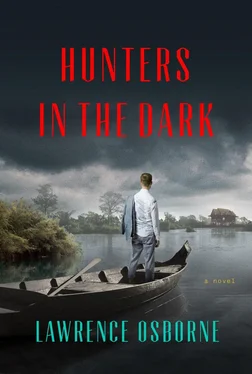The doors of the car slammed and the figures of two shabby English tourists appeared in the confusion of shadows, and behind them the Khmer driver holding their bags. They came in a group toward the loggia and the whites had a look of frigid alarm, as if their calculation to trust the lush images of a website had suddenly been shown to have backfired.
“It’s just a wee lodge in the mountains — nothing really,” the proud owner was saying, leading the way.
Simon and Sothea were obliged to get up and greet the newcomers and as they did so the driver put down the bag, at Mick’s suggestion, and hung back at the edge of the light thrown down by the crazy shell-casing lamps. Simon looked down at him briefly and a shock went through his body, as if physically. He recognized Ouksa at once. Their eyes did not meet and Simon half turned and took Sothea’s hand and pulled her to one side, to the rail which was darker than the table they were seated at. He was not sure if she would understand or even if she would recall the driver. There was no sign that Ouksa had looked over at them or recognized him. The barangs were busy making their arrangements and the man was paying him. The confusion of the rain might have helped. The transaction was completed and the driver turned away quickly and stepped back toward the car. He had left the engine running and appeared anxious to be on his way without ado. As the visitors struggled onto the loggia Mick stood at the foot of the small flight of steps and watched the car recede, lifting his hand once by way of farewell. It was entirely possible that he knew Ouksa or had had dealings with him in the past. Who could say? Simon came back to the table and they were introduced to Bill and Sarah Miles.
“Robert,” he said to introduce himself, “Robert O’Grieve. This is my wife, Sothea. She’s a vet.”
“Oh, a vet,” the Englishwoman cried.
“Yes,” Sothea said to her in Khmer, “not a whore.”
“What did she say?”
“She said she’s pleased to meet you.”
They were forced to eat all together and the meal therefore dragged on interminably. The visitors rehearsed all the tedious and entirely predictable dramas of their voyage overland from Bangkok. Was there not even one mishap that had afflicted them which he had not heard a hundred times before? Gradually, though, the rain died down and he suggested to Sothea that they go back to the cabin and get to bed early.
“It’s one of those things about living in the country here,” he said to the Mileses. “One goes to bed extremely early. It’s like it can’t be helped.
“At seven?” Mr. Miles said, wide-eyed.
“Sometimes even earlier.”
“I’ll be damned. It’s worse than Chalvington with Ripe.”
“I am sure Mr. Mick will offer you some of his homemade brandy. We call it Khmer brandy but it’s nothing of the sort.”
“It’s a fine drink,” Mick protested. “And it’s on the house!”
“Will it kill us?” Mrs. Miles asked.
“It’s been known tae happen.”
“Maybe it’ll keep the mosquitoes away,” her husband suggested.
“That it will,” Mick said triumphantly.
Simon and Sothea rose and said their good-nights.
“Just don’t go wandering about after four brandies,” Simon said. “That’s my recommendation.”
“Why?” from the Englishwoman.
“You might be mistaken for a deer in the dark.”
They walked back down to the river between the lines of yellow tape and Simon held Sothea’s hand and then held her closer. Suddenly, for some reason, he felt a rush of tenderness for her, a desperate need to know that she loved him back and needed him as much as he needed her.
“Who are those awful people?” she said quietly.
“We call them limeys. English. They’re all right.”
“Are they angry?”
“I don’t know. Did they seem angry?”
“They seemed like they were going to explode.”
“Maybe they will explode.”
Now, more than previously, he wanted to leave before morning. He had always gotten a strange feeling from Ouksa and seeing the driver again had raised an alarm deep within him. It was, like so many other things, an omen — and Simon believed categorically in omens. There had to be a meaning in such a coincidence. Naturally, it might not be a coincidence at all. It was a small region and people crossed each other’s paths all the time. But still, there was something about Ouksa that was not blind. He seemed to know what he was doing at all times. He was someone who kept his ear close to all grapevines. That little slithering dark-eyed snake. He had come into the forest and seen them.
They lay on their bed and shot up with clean needles and then lay quietly in each other’s arms listening to the tree frogs and the cicadas until the lights went off outside and the darkness augmented so that the river itself gave off a kind of black luminescence.
“Are we alone?” she said, thinking that she could hear things in the night.
“Of course we’re alone,” he answered.
Though he was not sure.
“I don’t want to stay here tomorrow,” she said.
“Nor do I. Maybe we’ll leave.”
“Can we leave when the sun comes up?”
“We won’t sleep anyway.”
“Then let’s leave.”
He lay awake wide-eyed. The Cambodian jungle had never made him feel at ease. It had a depth and velvety density that suggested something being concealed and withheld. The birds speaking to him but not saying anything he could find pleasurable. A realm of dinosaurs and reptiles, musical and lilting but also filled with ghosts. It gripped him and yet it left him cold, mentally suspended.
When fear came to him, indeed, Simon always relished it in some way. Fear was the most intense feeling by far, and the most complex. But he was not sure what he was afraid of now. It was just the smallness and madness of the room itself. His life had boiled down to rooms, it was spent entirely in rooms on the roads, but mostly in rooms. A suitcase stuffed with money that was not his, a few items of unwashed clothes and his “happiness gear.” It was vagrancy taken to a fine level.
All his life, considered from a certain perspective, had been leading up to such an outcome. Vagrancy had become second nature to him from an early age. His dropping out from Yale had been the warning sign which even he had not heeded. His family had merely taken it to mean that their pessimism about him — formed during his early years — had proved to be accurate. Old New England families had a strong and tight-lipped fatalist streak. They were personality realists.
They were a bit like Buddhists in that regard. His father had not argued much with him about it; Simon had made the argument that he was better suited to scriptwriting out west. It was not a very original aspiration but he had duly gone out west and written some garbage in a rented house in Twentynine Palms and then moved to Los Angeles and gradually discovered that he had even less industriousness at his disposal than he had talent. Those, however, were the fun years. He went through all the prescribed experiments of the American middle classes. He circled around the Burning Man trust-fund girls in San Francisco, he did the peyote inductions and the Esalen retreats. It was better than nothing.
He tired of it only when his internal restlessness produced the inevitable surfeit and the drugs had begun to wear him down and make him desultory. At twenty-five he found himself in Mendocino making olive oil and living with an Iranian girl. He had plans to write a screenplay based on the life of Carlos Castaneda and his harem of deranged groupies; but it frittered itself away among the olive stills and the garden dinners sweetened with home-grown marijuana. It was hopeless, he realized.
Читать дальше












